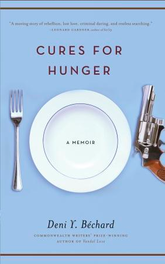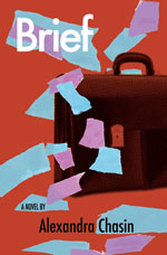In Deni Y. Béchard’s memoir Cures for Hunger, the reader is introduced to the author as a young boy enamored with his father. The author’s father, André, harbors a wild thirst for danger that burrows in his personality and threatens his family. We see this in the opening scene when André takes his children to sit in his truck over railroad tracks. As the train barrels toward the family, André pretends the truck has stalled until the last possible moment. Antics like this one terrify and thrill his children. Then there is the darker side, the sunken eyes and secrets. After the family’s escape from André—and that’s how it felt, kids packed in the car, speeding across the Canadian border in the middle of the night—Béchard blames his mother for taking him away from his father. In the years leading up to his fifteenth birthday, Béchard discovers pieces of André’s criminal record and resolves to move back in with his father. His hope to quench his fascination with André’s past is shadowed by the realization that his father is not the same man he remembers from childhood.
Béchard explores what it means to be in limbo between craving a father’s love and being repulsed by his lifestyle. In his memoir, the author appears troubled, wanting nothing more than a strong patriarchal figure as he picks fights at school and writes dystopian fantasies in his bedroom. But his redeeming qualities are limited.
0 Comments
The psychiatrists were left scratching their heads. They could not understand how such a polite person who seemed together could commit such a heinous crime. They walked away empty-handed. From the time a reader encounters the first sentence in Alexandra Chasin’s Brief, “I have requested an oral argument because I’d like to try, if I may, why my representation and I have chosen this defense, uncommon though it is, and why I would take issue with the psychiatrists’ findings,” he knows there is something wrong. Our narrator seems a little off and eventually we understand why. But at the heart of Brief is a narrator who is trying to change our outlook on how we perceive other people.
Reading Brief is an experience unlike any other. It is the first book that can be downloaded as an interactive app that changes with every read and reread of each page. The pages inside are littered with torn magazine images that feel as though they came from the '60’s. If you flip forward a page, but then need to go back again to re-read, the page you have just left is not the same. The images have changed and so has the layout. Each new read will be a different experience for the reader. This idea of book construction is so unique that it is sure to be soon copied. |
Archives
July 2024
Categories
All
|
|
Glassworks is a publication of Rowan University's Master of Arts in Writing 260 Victoria Street • Glassboro, New Jersey 08028 [email protected] |
All Content on this Site (c) 2024 Glassworks
|



 RSS Feed
RSS Feed
